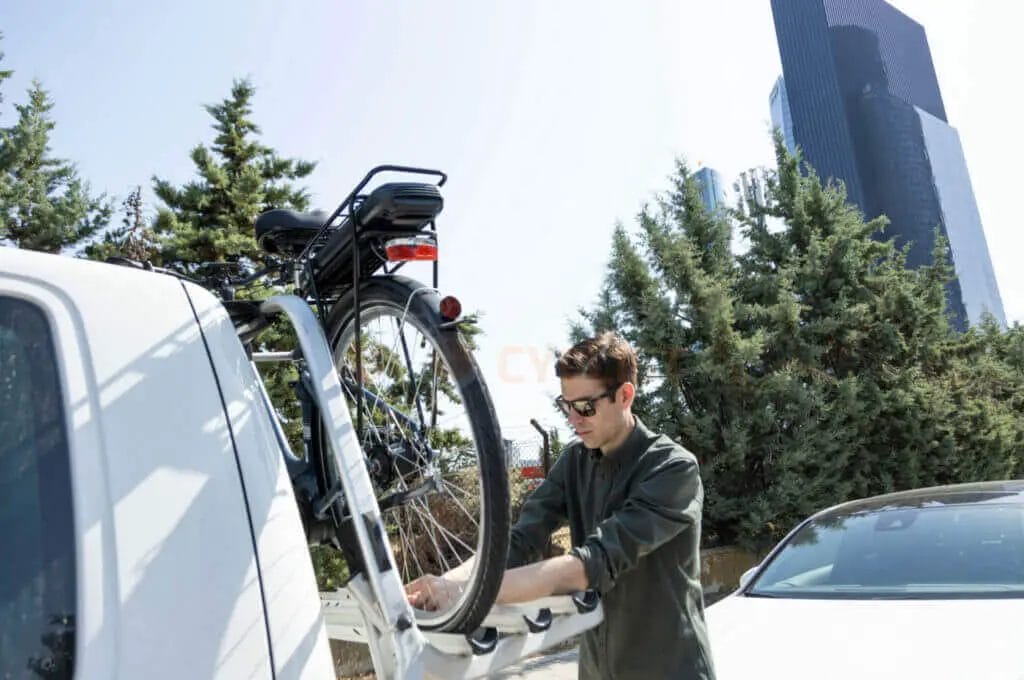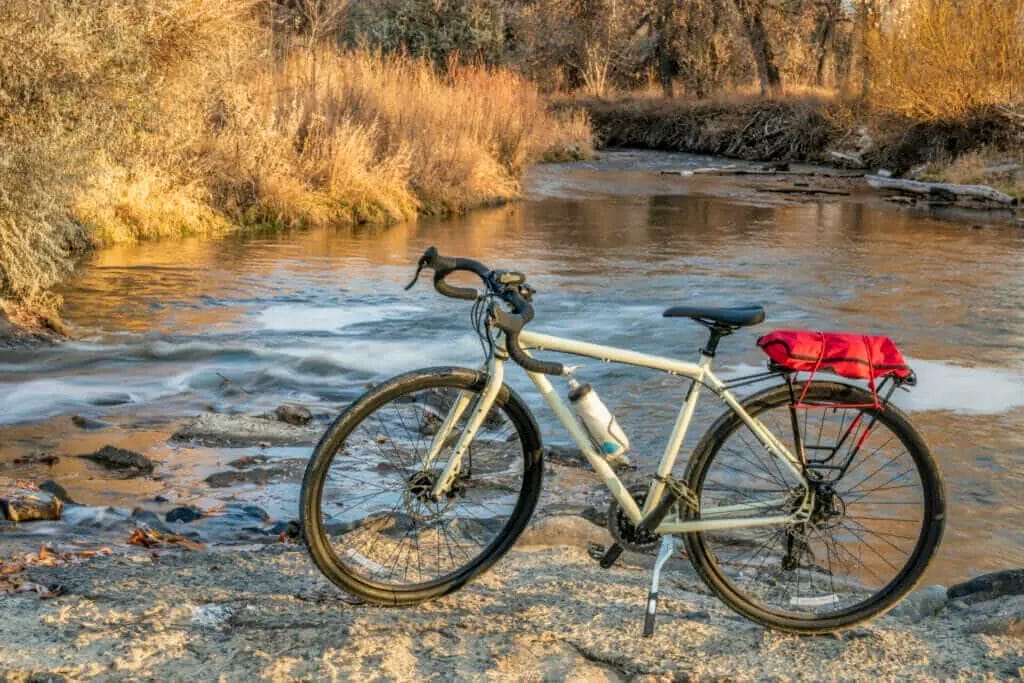Last Updated on February 10, 2024 by Vinson Lozano

So you’re thinking about going the extra mile and installing a bike hitch on your car. Whether you’re a cycling enthusiast or just want to explore new terrains with your bike, a bike hitch can go a long way in transporting your cherished cycling partner.
Why consider putting a bike hitch on your car?
First off, a bike hitch gives you the freedom to take your bike anywhere. From mountain trails to city park paths, a bike hitch lets you easily venture beyond your backyard.
Even more, it saves you the trouble of squeezing your bike into the trunk or back seat, preserving the interior of your vehicle. Plus, it’s a secure way of transporting your bicycle where there’s limited risk of damaging either your car or your bike.
Factors to consider before installing a bike hitch
Now that you’ve decided on installing a bike hitch, it’s crucial to consider a few factors.
Cost Implications: On average, the price of a bike hitch ranges between $100 to $200, excluding the professional installation fee, which usually falls around $50 to $200.
Type of Hitch: You also need to decide on the right type of hitch that suits your car type and bike. Hitch-mounted bike racks could either be ‘hanging’ or ‘platform’ built, with each type differing in cost and functionality.
Installation: While you might consider self-installation to save money, professional installation ensures that the bike hitch is safely and correctly installed.
And don’t forget, consider the hitch’s future usage. If bike journeys are infrequent, a more economical, less permanent solution like a trunk mount might better suit you. Your decision ultimately depends on a cost-benefit analysis tailored to your specific needs.
Hitch Types and Cost
When planning to transport your bike using your car, pondering over the expenses involved in hitch installation is crucial. Remember, the type of hitch you go for significantly impacts the overall cost.
Different types of bike hitches and their features
1. Rear Shuttle Hitch: This hitch conveniently mounts at the back of the car. You’d love it as it accommodates multiple bikes without obstructing the driver’s view. However, it may increase your vehicle’s length, leading to parking trouble in confined spaces.
2. Roof Rack Bike Hitch: As the name proposes, this hitch mounts on the car’s roof. While it might be a bit challenging to load bikes due to its height, it permits complete access to the car back and avoids increasing the vehicle’s length.
3. Towbar Hitch: This hitch is fixed onto the car’s towbar. It’s comparatively easy to use and offers maximum stability for your bikes but may limit access to the back of the vehicle.
Cost breakdown of each bike hitch type
The hitch installation cost varies depending on your choice of hitch type:
• Rear Shuttle Hitch: The price fluctuates between $100 and $250, excluding professional installation charges.
• Roof Rack Bike Hitch: Typically, this will cost between $150 and $400, installation cost not included.
• Towbar Hitch: This range varies massively and can fall between $50 and $600, again, expect to pay more for professional installation.
Before purchasing, don’t forget to consider hitch-fit compatibility with your vehicle along with your budget and needs.
Professional Installation vs DIY
If you’re a biking enthusiast who frequently travels with your bike, you’ve likely considered adding a bike hitch to your car. When it comes to bike hitch installation, you have two choices: professional installation or DIY.
Benefits and drawbacks of professional installation
Professional installations offer peace of mind that your bike hitch has been fitted correctly and securely. Plus, many professionals will offer a warranty on their work. However, the significant drawback is the cost. Depending on the complexity of the hitch and your specific car model, this could range from $100 to $800, excluding the cost of the bike hitch itself.
On the other hand, DIY installations can save you a pretty penny, but they also come with their own set of challenges. Not all bike hitches are equally easy to install, and a poor installation job can put your bike, car, and safety at risk.
Step-by-step guide for DIY installation of a bike hitch
If you decide to install the hitch yourself, the cost will be significantly lower. The hitch itself typically costs anywhere from $50 to $200. Image you saved $100 by doing it yourself, which you can use for other essentials.
For a successful DIY, you’ll need dedication, time, and a step-by-step guide. First, ensure you have the right hitch for your vehicle and the proper tools. Next, follow the provided guide diligently. Typically, this involves securing the hitch to your car’s frame, tightening various nuts and bolts, and finally adding the receiver where you’ll hang your bike.
Additional Equipment and Accessories
Are you thinking about installing a bike hitch on your vehicle? If so, you’ll need to consider not just the cost of the bike hitch itself, but also the price of any additional equipment or accessories needed for the installation.
Essential accessories for bike hitch installation
To put a bike hitch on your car, you’ll need various accessories such as:
- Bike Hitch: The key piece, costs usually range from $100 to $200, depending on the type and brand.
- Hitch Pin: Required to secure the hitch to your car, generally costing around $10 to $20.
- Installation Tools: If you’re planning on doing the installation yourself, you may need to purchase or rent the necessary tools.
Costs and recommendations for additional equipment
If you decide to hire a professional for installation, the labor costs can range from $50 to $200, depending on the complexity of the work and the region where you live.
Bike Rack: In addition to the hitch, you’ll likely need a bike rack, which can cost anywhere from $40 to $400, depending on the quality and the number of bikes it can carry.
Taillight Wiring: Depending on the design of your car and bike rack, you might need additional taillight wiring, which generally costs around $30 to $50.
Though it may seem like a lot of expenses, investing in a bike hitch can significantly enhance your biking experience by making it easy to transport your bikes. It’s a one-time investment that can provide you with years of convenience and enjoyment.
Considerations for Different Car Types
Picturing yourself on two wheels, cycling through the countryside or tackling off-road terrains? Ideal as it might sound, your bike won’t magically appear at these locations! But wait, what about a bike hitch? It’s a simple yet fantastic way to transport your bikes using your car.
Whether you own a sedan, an SUV, or truck, every type of vehicle has specific considerations when it is about installing a bike hitch.
Specific considerations for sedans, SUVs, and trucks
Starting with sedans, due to their low ground clearance and compact size, a trunk-mounted bike rack would be an ideal choice. It’s easy to install and remove as needed.
Now, when it comes to SUVs, a hitch-mounted bike rack can be a great option considering the height and body structure of the vehicle. This type of rack can carry multiple bikes and provide secure mounting.
Switching the gear to trucks, you cannot ignore the convenience of a truck bed bike rack. They offer easy loading and unloading of bikes and also gives you room for other gears.
Cost implications for different car types
As for the cost, trunk-mounted bike racks for sedans might start from $50. Hitch-mounted racks for SUVs might run from $150 to $300, depending on the brand and model. Lastly, your truck bed bike racks might start from $100.
No matter the car type or bike rack, remember that these are only estimated figures. Prices variate based on different factors like the product brand, type, and where you are buying from. For precise figures, you might want to scope out bike shops or online marketplaces to find a hitch that serves your needs and fits your budget.
Maintenance and Longevity
Biking as a hobby or a sport is priceless. Securing your bike to get to your riding destinations safely, on the other hand, has a number. You can’t. Just. Wait. to get on the trail with your exciting new mountain bike. Now you’re pondering, how much will it cost to get a bike hitch and secure your bike on your car? Don’t worry, we’ve got you covered.
Tips for maintaining and prolonging the lifespan of your bike hitch
Regular Inspections: Always ensure your bike hitch is in good condition before embracing those bumpy terrains. So, spare a few minutes to check for wear and tear, loose bolts, and anything out of the ordinary.
Proper Usage: Resist the urge to overburden your bike hitch, remember to check the weight capacity before loading your bike.
Cleaning: Your bike hitch, if not cleaned regularly, may become a haven for salt and dirt, which promotes rusting. Cleaning it occasionally with a sponge and warm, soapy water will do the trick.
Costs associated with maintenance and repairs
DIY cost: Your cost on maintaining a bike hitch is relatively low. You only need to invest minimal amounts in anti-seize greases and rust removers, typically below $20.
Expert help cost: Should you require an expert’s touch, this would typically cost anywhere between $50-$70.
So, now that you know how to care for your bike hitch and are aware of the costs associated with its maintenance, go ahead and enjoy the ride! Brace yourself for the exhilarating biking adventures lying ahead.
Conclusion
Knowing the expense of installing a bike hitch on your car is a significant factor as you delve into your biking adventures.
Summary of costs and factors to consider
The cost for installing a bike hitch on your car primarily depends on two components: the cost of the hitch itself and the installation charges.
- The Hitch: Typically, a good quality hitch can range from $100-$400, depending on the type (trailer, receiver, or fifth wheel), style, and the brand.
- Installation Cost: If you choose to hire professional help, it could run anywhere between $100-$200. However, if you’re installing it yourself, the only cost incurred is that of your time and effort.
Another thing to consider is the towing capacity of your car. Make sure a bike hitch is suitable for your vehicle; an overstrained hitch may lead to damages, causing extra expenses in the long run.
Final thoughts on the affordability of putting a bike hitch on a car
Budgeting for a bike hitch on your car is essential for your journey of becoming a bike enthusiast. Yes, it can be a considerable investment, but consider this: the freedom to bring your bike anywhere is invaluable for creating memorable adventures and harnessing that surge of adrenaline.
So, in a nutshell, whether you choose the DIY route or prefer professional assistance, the cost of a bike hitch can range from $200-$600. But remember, the unparalleled joy of biking is priceless – making every penny spent worth it.


